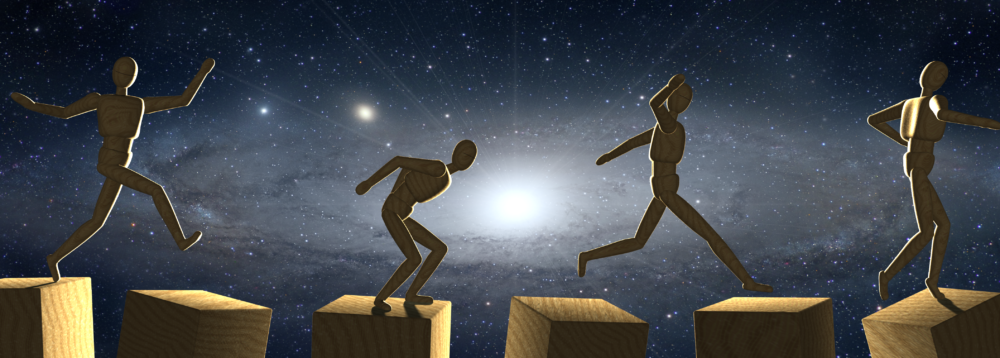Or, Why you’re not actually bad at remembering people’s names.
For a long time I’ve been in the habit of avoiding using certain statements to describe myself, even if they’d have expressed something that I really felt at the time. They’re phrases that, for one thing, seem to show up very commonly in conversation, like the following:
- “I’m terrible at remembering people’s names.”
- “I’m a complicated person.”
- “I’m shy at first, but outgoing when you get to know me.”
- “My life is so busy/crazy.”
- “I’m so sarcastic.”
- “I don’t really belong here.” (impostor syndrome)
Another thing we can note about these phrases is that we almost never hear the inverse: “I’m good at remembering names,” “I’m a simple person,” etc.
Now, at first glance it seems like anyone who would intentionally avoid phrases like these is just trying a bit too hard to look and feel unique. I think I have a different and more defensible explanation; I actually believe that it’s often inaccurate to use them. For a while I’ve had some idea of the reasoning behind this, but it’s only recently that I tried to consciously sort it out. Here’s what I arrived at: There is a logical case to be made that those phrases which people commonly use to describe themselves are not as appropriate for describing oneself as one may feel they are. And again, it’s not because they could make a person look bland and unoriginal, it’s because they’re less correct than they seem.
Examples
Let’s get into this by looking at the first example: “I’m terrible at remembering names.” This is often said apologetically when one forgets the name of a recently-met contact. And sometimes it’s said immediately after learning the name for the first time, as a kind of insurance against the inevitable forgetting later on. Now, what do people mean when they say they are bad/terrible at something? They mean that they fall below the standard, to some significant degree. What is “the standard?” It’s usually the average fitness of all the members of some broader group. When I say I have dark hair, it’s because the average person (in the US at least) seems to have lighter-colored hair than I do. If a self-description doesn’t differentiate me from others, it’s not really valuable as a description. “I have two hands and a face.”
If people are disproportionately describing themselves in a particular way, it implies that 1) they each think it’s a somewhat unique descriptor; otherwise, as I said above, it wouldn’t be worth saying at all. But when it seems that a majority of people would say they’re “great” or “terrible” (significantly above or below the average) at the same thing, we know at least some of them must be incorrect, because obviously only half of any set can really be above/below the average, and even fewer can be extreme enough that we’d call them “great” or “terrible.” So, are they lying? If you were to lie about yourself, you might be aiming for uniqueness, but these phrases do just the opposite. You might also be aiming for other positive traits, but these phrases are often neutral or negative. So if they aren’t unique or necessarily flattering, and people commonly use them anyway, the only remaining explanation is that 2) they genuinely feel these explanations apply to them, despite the fact that they must often be wrong.
We can conclude that some common self-descriptions are incorrect but seem correct. In other words, our self-descriptions can suffer from cognitive biases and receive support from poor reasoning.
Let’s find some hard examples of these mysterious biases I’m talking about: when it comes to remembering people’s names, we can think of a few genuine yet non-rational factors that could influence how we might view our own aptitudes against those of others:
- First, we tend to recall instances of forgetting people’s names more clearly than the times we remembered accurately, and this is because the social friction makes us feel anxious which, like any strong emotion, makes the memory more distinct.
- Similarly, we tend to remember our own mistakes more clearly than those of others. Both cause social friction, but we feel a stronger emotional spike (guilt) when we are the ones responsible for it.
- Or, maybe we are just trying to dispel social tension. The statement is an innocent explanation for why we forgot the person’s name. It says, “You’re not unimportant to me; this is just how I am.” This is deception, yes, but isn’t it possible that the person we most need to deceive in that situation is ourselves? Keep in mind that people tend to automatically believe they are courteous and considerate at heart. When we forget someone’s name, isn’t it easier for our egos to just adopt this innocent explanation?
These are my guesses; it’s not meant to be an exhaustive list. The point is that any of these could explain why being “terrible at remembering names” is so commonly professed and being “very good at remembering names” is not.
Let me give one more example: “I’m a complicated person” (the implication being “more complicated than average”). Really, don’t we each think this about ourselves, in some way, even if we’re too humble to say it? Don’t we each believe that, say, advertising doesn’t really work on us, or that we have the ability to truly surprise those around us? But how can all of us be complicated people? Where are the simple people (who are necessary to give complexity any meaning)? Could it be that:
- We know ourselves more deeply than we know anyone else? I’ll never know as many details and nuances about anyone else as I know about myself, so there can never be a truly fair comparison in something as general and unmeasurable as personal complexity.
- We just need it to be true? Who could bear to believe they are simple? It implies predictability and worse, malleability. Simple people are seen as the “pawns” and “suckers” that complicated people use to achieve their ends. No one who values his own will could admit that his mind and personality are simple. As an aside, this “need for it to be true” explains another too-common descriptor, “I’m a good person,” but we don’t have time to look into that right now.
Analysis
Well, now we have five possible explanations of this phenomenon after looking at only two examples, and not every explanation applies to every example. Really there are countless cognitive biases, and while we can individually learn and correct for them, they continue to affect the human population generally. Fortunately, it’s not the explanations that we care about; the important thing is to be able to recognize when a tempting self-description must be the result of some bias. And that part is easy: if it appears that “everyone” describes themselves one way, and “no one” is saying the opposite, we can and should assume there is some bias or skewed perception involved.
Response
What do we do when we recognize this? Well, when I recognize other people doing it, I do nothing. That is, when people talk about themselves as individuals, even in these overly typical ways, I try to take them at their word unless I have further evidence against it. I may know that as a group, people are suffering from bias in their perceptions and descriptions of themselves, but unless I have specific evidence against “this person,” I don’t assume he’s the one who’s biased. Some people, obviously, are actually great/terrible at those things after all.
What’s more interesting is when we recognize the phenomenon in ourselves. When we become aware of a bias, we’re admitting, “The way the world looks to me right now is skewed in this specific direction.” In response, we can and probably will consciously try to correct for it. It would be like if I asked you, “Is this paper more green or blue? But keep in mind, you’re wearing blue-tinted sunglasses right now.” You’d consciously bias yourself toward “green” in order to correct for the effect of the glasses and give yourself a better chance of getting it right.
In the same way, we can (and naturally will) try to account for biases in our descriptions of ourselves—if we recognize them. We’d ask, “Am I really terrible at remembering names? I feel like I must be, since I just forgot this person’s. But come to think of it, I remembered the last few people I met before that, and other people have forgotten my name plenty of times, too.” And right there, that “come to think of it,” is your mind forcing itself to be fair, despite being predisposed toward one conclusion.
So no, if anyone asks, I’m not personally shy-at-first, or unqualified for my job, or bad at taking standardized tests, and chances are you’re not as bad at remembering names as you think.

